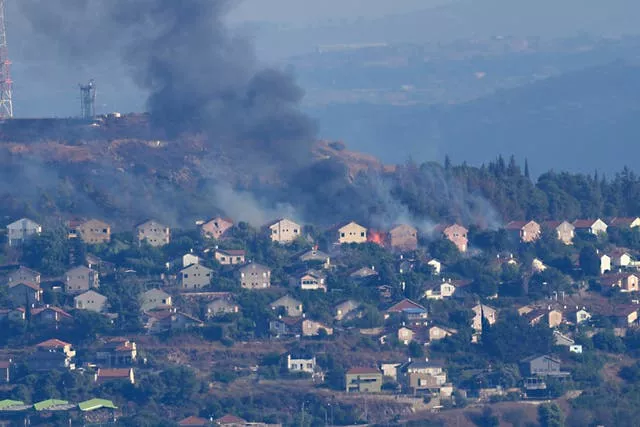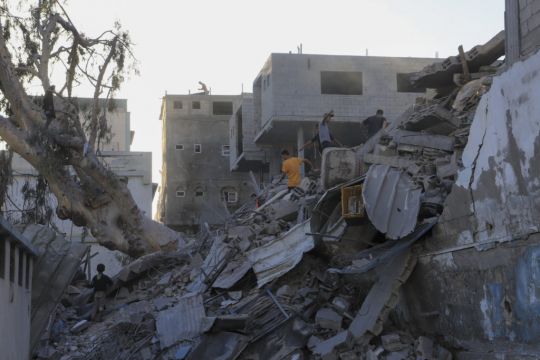The Israeli cabinet is to convene to discuss Hamas’ latest response to a US-backed proposal for a phased ceasefire in Gaza, amid a revival of diplomatic efforts aimed at ending the nine-month war.
Fighting, meanwhile, intensified between Israel and Lebanon’s Hezbollah, with the militant group saying it had fired more than 200 rockets and exploding drones into northern Israel to avenge the killing of senior commander Mohammad Naameh Nasser in an Israeli air strike the day before.
The relatively low-level conflict has raised fears of a potentially even more devastating war in the Middle East.
Hezbollah has said it will halt its attacks if there is a ceasefire between Hamas – a fellow Iran-backed ally – and Israel.

The US has rallied world support behind a plan that would see the release of all of the scores of hostages still held by the militant group in return for a lasting truce and the withdrawal of Israeli forces from Gaza.
But until now, neither side appears to have fully embraced it.
Hamas suggested “amendments” to the proposal last month, some of which the US said were unworkable, without providing specifics.
Israeli Prime Minister Benjamin Netanyahu has confirmed that the original proposal was an Israeli one, but has raised doubts over whether it would end the war – a key Hamas demand.
Hamas confirmed it had sent another response to Egypt and Qatar, which are mediating the talks, without providing details.
A US official said the Biden administration was examining the response, calling it constructive but saying more work needed to be done.
Too much of what's going wrong today stems from a failure of empathy & compassion. A binary 'you are either w/ or against me' mindset.
We must keep our faith in humankind, overcome reductive thinking & engage in genuine dialogue.
We must reject all attempts to dehumanize others pic.twitter.com/vHmx6e78b1Advertisement— Volker Türk (@volker_turk) July 4, 2024
An Israeli official said Mr Netanyahu would convene a cabinet meeting to discuss the latest developments surrounding the negotiations. Israel would likely hold additional consultations before making a final decision on any amended proposal.
As ceasefire talks appeared to be gaining new steam, the health ministry in Hamas-run Gaza said the death toll in the war had climbed past 38,000.
Hamas political official Bassem Naim said that the group has neither accepted nor rejected the American proposal, and has “responded with some ideas to bridge the gap” between the two sides, without elaborating.
Ismail Haniyeh, Hamas’ top political leader, has shared suggestions with Egyptian, Qatari and Turkish officials, the group said in a statement.
US officials have said the latest proposal has new language that was proposed to Egypt and Qatar on Saturday and addresses indirect negotiations that are set to commence during the first phase of the three-phase deal that US President Joe Biden laid out in a speech on May 31.

The first phase calls for a “full and complete ceasefire”, a withdrawal of Israeli forces from all densely populated areas of Gaza and the release of a number of hostages, including women, older people and the wounded, in exchange for the release of hundreds of Palestinian prisoners.
The proposal called for the parties to negotiate the terms of the second phase during the 42 days of phase one.
Under the current proposal, Hamas could release all of the remaining men, both civilians and soldiers, during the second phase. In return, Israel could free an agreed-upon number of Palestinian prisoners and detainees.
The releases would not occur until “sustainable calm” takes effect and all Israeli troops withdraw from Gaza. The third phase would see the return of the remains of hostages.
The transition from the first to the second phase has appeared to be the main sticking point.
Hamas is concerned that Israel will restart the war after the first phase, perhaps after making unrealistic demands in the talks.

Israeli officials have expressed concern that Hamas will do the same, drawing out the talks and the initial ceasefire indefinitely without releasing the remaining captives.
In a lengthy television interview last month, Mr Netanyahu said that he was prepared to make a “partial deal”, but was committed to continuing the war “after a pause” in order to annihilate Hamas.
Later, speaking before Israel’s parliament, he said Israel remains committed to the deal outlined by Mr Biden.
The war began when Hamas-led militants launched a surprise attack on October 7 into southern Israel, attacking multiple army bases and farming communities and killing around 1,200 people, mostly civilians.
They abducted another 250 people. more than 100 of whom were released during a weeklong ceasefire in November. Militants are still holding around 80 hostages and the remains of 40 others.
Israel launched a major offensive in response to the October 7 attack that has killed more than 38,000, according to health officials in Gaza, who do not say how many were civilians or militants.
The war has caused vast destruction across the territory, displaced most of its population of 2.3 million – often multiple times – caused widespread hunger and raised fears of famine.







